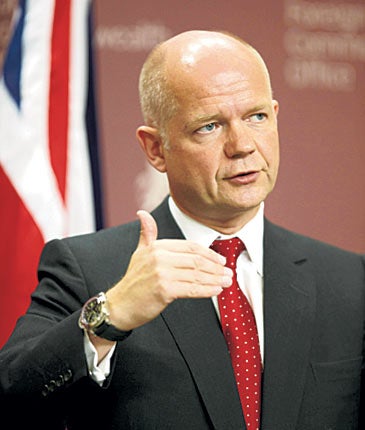Three days to get out of the UK – Hague expels Libyan embassy staff
Rebel council recognised as 'sole governmental authority', with £91m of assets to be unfrozen

Your support helps us to tell the story
From reproductive rights to climate change to Big Tech, The Independent is on the ground when the story is developing. Whether it's investigating the financials of Elon Musk's pro-Trump PAC or producing our latest documentary, 'The A Word', which shines a light on the American women fighting for reproductive rights, we know how important it is to parse out the facts from the messaging.
At such a critical moment in US history, we need reporters on the ground. Your donation allows us to keep sending journalists to speak to both sides of the story.
The Independent is trusted by Americans across the entire political spectrum. And unlike many other quality news outlets, we choose not to lock Americans out of our reporting and analysis with paywalls. We believe quality journalism should be available to everyone, paid for by those who can afford it.
Your support makes all the difference.The Foreign Secretary William Hague yesterday moved to release millions of pounds worth of Libyan assets frozen in Britain to rebels in the east of the country fighting Muammar Gaddafi.
Mr Hague announced that Britain was to officially recognise the rebel National Transitional Council (NTC) as the "sole governmental authority" in Libya. As a result, the remaining nine regime diplomats in Britain will be expelled and the Libyan embassy in Knightsbridge, west London, handed over to the NTC.
Mr Hague's decision also means that the UK will be able to offer greater practical assistance to the rebels, starting with the unfreezing of assets worth £91m belonging to the NTC-controlled Arabian Gulf Oil Company. There was speculation that the money could be used to arm rebels fighting against Colonel Gaddafi's forces and that once handed over it would be hard to control where it went. But British diplomats stressed it would be used for reconstruction, infrastructure and healthcare needs.
The decision to recognise the NTC follows an agreement by the international contact group on Libya, meeting in Istanbul on 15 July, to deal with the NTC as the legitimate governing authority in the country. "This decision reflects the National Transitional Council's increasing legitimacy, competence and success in reaching out to Libyans across the country," Mr Hague said.
"Through its actions, the National Transitional Council has shown its commitment to a more open and democratic Libya, something that it is working to achieve in an inclusive political process. This announcement reflects the facts on the ground and to increase support for those fighting and working for a better future in Libya."
Britain now has between 30 and 40 diplomats working in the NTC stronghold of Benghazi and officials say they have developed a good relationship with the NTC leadership. Mr Hague said the council's actions were in sharp contrast to those of Colonel Gaddafi, whose attacks on his own people had "stripped him of all legitimacy".
He added that Britain would now deal with the NTC "on the same basis as other governments around the world" and would begin work on unfreezing further assets, including currency stocks of the Libyan central bank, held in the UK.
The NTC spokesman Guma al-Gamati welcomed the British recognition, saying that it was a matter of "when, not if" Colonel Gaddafi was forced out of power. "It's significant because... normally the UK only recognises states but now it has recognised the NTC as the legitimate government of Libya," he told BBC Radio 4's World At One. Asked about the appearance of the convicted Lockerbie bomber, Abdelbaset al-Megrahi, at a pro-Gaddafi rally in Tripoli, Mr Hague reiterated the Coalition's position that he should never have been released.
Timeline
1979 Moussa Koussa, Muammar Gaddafi's security confidant, takes charge at Libya's UK embassy, establishing a revolutionary People's Bureau. He is expelled in a year.
1984 Shots are fired from the Libyan embassy during an anti-regime rally. Yvonne Fletcher is shot dead in a burst of gunfire. After a 10-day siege, 30 Libyan diplomats leave the building and are deported. Britain severs diplomatic ties with Libya.
1988 259 people are killed in the Lockerbie bombing.
1991 Scottish police charge Libyan officials, including Abdelbaset al-Megrahi, with plotting the attack.
1999 Britain reopens diplomatic channels with Libya after the Gaddafi regime accepts "general responsibility" for the death of PC Fletcher.
2004 Tony Blair shakes hands with Gaddafi and declares a "new relationship" with Libya.
2007 Blair secures the "deal in the desert", a prisoner swap that would include the release of Megrahi. The BP boss Tony Hayward stands beside Blair as he signs a deal giving the oil giant £550m exploration rights.
May 2011 Libyan ambassador to the UK, Omar Jelban, is expelled. Two diplomats are expelled for spying.
July 2011 The Foreign Secretary, William Hague, announces all Libyan diplomats will be expelled and recognises the Libyan rebel council.
Join our commenting forum
Join thought-provoking conversations, follow other Independent readers and see their replies
Comments